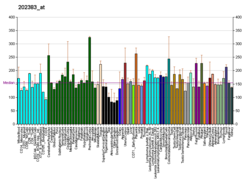KDM5C
Lysine-specific demethylase 5C is an enzyme that in humans is encoded by the KDM5C gene.[5][6][7] KDM5C belongs to the alpha-ketoglutarate-dependent hydroxylase superfamily.
Function
[edit]This gene is a member of the SMCY homolog family and encodes a protein with one ARID domain, one JmjC domain, one JmjN domain and two PHD-type zinc fingers. The DNA-binding motif suggest this protein is involved in the regulation of transcription and chromatin remodeling. Mutations in this gene have been associated with X-linked intellectual disability. Alternatively spliced variants that encode different protein isoforms have been described but the full-length nature of only one has been determined.[7]
See also
[edit]- Xp11.2 duplication, section KDM5C
References
[edit]- ^ a b c GRCh38: Ensembl release 89: ENSG00000126012 – Ensembl, May 2017
- ^ a b c GRCm38: Ensembl release 89: ENSMUSG00000025332 – Ensembl, May 2017
- ^ "Human PubMed Reference:". National Center for Biotechnology Information, U.S. National Library of Medicine.
- ^ "Mouse PubMed Reference:". National Center for Biotechnology Information, U.S. National Library of Medicine.
- ^ Agulnik AI, Mitchell MJ, Mattei MG, Borsani G, Avner PA, Lerner JL, Bishop CE (Jun 1994). "A novel X gene with a widely transcribed Y-linked homologue escapes X-inactivation in mouse and human". Human Molecular Genetics. 3 (6): 879–84. doi:10.1093/hmg/3.6.879. PMID 7951230.
- ^ Wu J, Ellison J, Salido E, Yen P, Mohandas T, Shapiro LJ (Jan 1994). "Isolation and characterization of XE169, a novel human gene that escapes X-inactivation". Human Molecular Genetics. 3 (1): 153–60. doi:10.1093/hmg/3.1.153. PMID 8162017.
- ^ a b "Entrez Gene: JARID1C jumonji, AT rich interactive domain 1C".
Further reading
[edit]- Agate RJ, Choe M, Arnold AP (Feb 2004). "Sex differences in structure and expression of the sex chromosome genes CHD1Z and CHD1W in zebra finches". Molecular Biology and Evolution. 21 (2): 384–96. doi:10.1093/molbev/msh027. PMID 14660691.
- Beausoleil SA, Jedrychowski M, Schwartz D, Elias JE, Villén J, Li J, Cohn MA, Cantley LC, Gygi SP (Aug 2004). "Large-scale characterization of HeLa cell nuclear phosphoproteins". Proceedings of the National Academy of Sciences of the United States of America. 101 (33): 12130–5. Bibcode:2004PNAS..10112130B. doi:10.1073/pnas.0404720101. PMC 514446. PMID 15302935.
- Jensen LR, Amende M, Gurok U, Moser B, Gimmel V, Tzschach A, Janecke AR, Tariverdian G, Chelly J, Fryns JP, Van Esch H, Kleefstra T, Hamel B, Moraine C, Gecz J, Turner G, Reinhardt R, Kalscheuer VM, Ropers HH, Lenzner S (Feb 2005). "Mutations in the JARID1C gene, which is involved in transcriptional regulation and chromatin remodeling, cause X-linked mental retardation". American Journal of Human Genetics. 76 (2): 227–36. doi:10.1086/427563. PMC 1196368. PMID 15586325.
- Kimura K, Wakamatsu A, Suzuki Y, Ota T, Nishikawa T, Yamashita R, Yamamoto J, Sekine M, Tsuritani K, Wakaguri H, Ishii S, Sugiyama T, Saito K, Isono Y, Irie R, Kushida N, Yoneyama T, Otsuka R, Kanda K, Yokoi T, Kondo H, Wagatsuma M, Murakawa K, Ishida S, Ishibashi T, Takahashi-Fujii A, Tanase T, Nagai K, Kikuchi H, Nakai K, Isogai T, Sugano S (Jan 2006). "Diversification of transcriptional modulation: large-scale identification and characterization of putative alternative promoters of human genes". Genome Research. 16 (1): 55–65. doi:10.1101/gr.4039406. PMC 1356129. PMID 16344560.
- Santos C, Rodriguez-Revenga L, Madrigal I, Badenas C, Pineda M, Milà M (May 2006). "A novel mutation in JARID1C gene associated with mental retardation". European Journal of Human Genetics. 14 (5): 583–6. doi:10.1038/sj.ejhg.5201608. PMID 16538222.
- Tzschach A, Lenzner S, Moser B, Reinhardt R, Chelly J, Fryns JP, Kleefstra T, Raynaud M, Turner G, Ropers HH, Kuss A, Jensen LR (Apr 2006). "Novel JARID1C/SMCX mutations in patients with X-linked mental retardation". Human Mutation. 27 (4): 389. doi:10.1002/humu.9420. PMID 16541399. S2CID 25318561.
- Beausoleil SA, Villén J, Gerber SA, Rush J, Gygi SP (Oct 2006). "A probability-based approach for high-throughput protein phosphorylation analysis and site localization". Nature Biotechnology. 24 (10): 1285–92. doi:10.1038/nbt1240. PMID 16964243. S2CID 14294292.
- Olsen JV, Blagoev B, Gnad F, Macek B, Kumar C, Mortensen P, Mann M (Nov 2006). "Global, in vivo, and site-specific phosphorylation dynamics in signaling networks". Cell. 127 (3): 635–48. doi:10.1016/j.cell.2006.09.026. PMID 17081983. S2CID 7827573.
- Iwase S, Lan F, Bayliss P, de la Torre-Ubieta L, Huarte M, Qi HH, Whetstine JR, Bonni A, Roberts TM, Shi Y (Mar 2007). "The X-linked mental retardation gene SMCX/JARID1C defines a family of histone H3 lysine 4 demethylases". Cell. 128 (6): 1077–88. doi:10.1016/j.cell.2007.02.017. PMID 17320160. S2CID 14729302.
- Tahiliani M, Mei P, Fang R, Leonor T, Rutenberg M, Shimizu F, Li J, Rao A, Shi Y (May 2007). "The histone H3K4 demethylase SMCX links REST target genes to X-linked mental retardation". Nature. 447 (7144): 601–5. Bibcode:2007Natur.447..601T. doi:10.1038/nature05823. PMID 17468742. S2CID 34527537.
External links
[edit]- JARID1C+protein,+human at the U.S. National Library of Medicine Medical Subject Headings (MeSH)
This article incorporates text from the United States National Library of Medicine, which is in the public domain.






